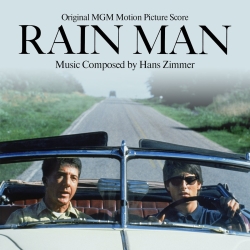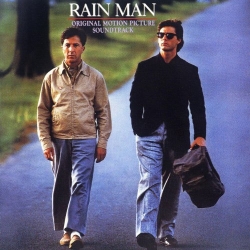RAIN MAN – Hans Zimmer
Original Review by Jonathan Broxton
There is a great serendipity in how Hans Zimmer became the film music megastar he is. Back in 1985 Zimmer co-scored the film My Beautiful Launderette with his mentor, Stanley Myers, when he was still a fresh-faced youngster working in London. That film was produced by Sarah Radclyffe, the co-founder of Working Title Pictures, who in 1988 produced A World Apart, the directorial debut feature of acclaimed cinematographer Chris Menges. That film was the first significant solo project of Zimmer’s career, and it just so happens that the film was seen by Diana Rhodes, the wife of director Barry Levinson, just as Levinson was working on his latest film, Rain Man. Rhodes recommended Zimmer to Levinson, and Zimmer received what he now refers to as ‘the call,’ which secured him the job, took him to Los Angeles, and utterly changed his life.
The film is based on a screenplay by Barry Morrow and Ronald Bass, and stars Tom Cruise as Charlie Babbitt, a slick, self-centered importer of luxury cars, whose latest deal leaves him in severe financial trouble. When Charlie’s estranged father dies, he travels to Ohio with his girlfriend Susanna (Valeria Golino) to settle the estate, only to learn that the vast majority of his father’s money has been left in trust to a mental institution. It is in this institution that Charlie meets Raymond (Dustin Hoffman), the older brother he never knew he had. Raymond is an autistic savant with an incredible memory and brilliance with numbers, but significant emotional and social impairment. Needing Raymond’s money to clear his debts, Charlie takes Raymond from the hospital to a motel, and then decides to take him back to Los Angeles and obtain formal custody of him, but when Raymond refuses to fly, they are instead forced to take a cross-country road trip in their father’s 1949 Buick Roadmaster convertible. As the journey ensues Charlie – who originally just wanted to exploit his brother – gradually learns for the first time what it means to have a family.
Considering the fact that Zimmer was hired for this movie very much on the strength of his score for A World Apart, it stands to reason that it should have a great deal in common with its predecessor. Like almost all Zimmer’s scores of that period, it is completely electronic and synthesized, but it makes use of an array of different keyboards – including the popular Fairlight CMI – and a truly inspired set of exotic sampled woodwind and percussion items, including pan pipes, a didgeridoo, and steel drums, which gives the score a wholly unique soundscape. It’s also very much a pop and rock score, with a 1980s vibe, and a likeable sense of forward motion that perfectly illustrates the film’s road movie setup. Thematically, the music tends to concentrate mostly on Dustin Hoffman’s Raymond character, following his emergence from institutionalization into the real world with a number of variations on two recurring motifs. Only occasionally does Tom Cruise’s Charlie get his own personal music, a swaggering and cock-sure idea that tends to assert itself in the scenes set in Las Vegas.
The original soundtrack album released in 1988 contained just two cues – “Leaving Wallbrook/On the Road” and “Las Vegas/End Credits” – for a total of just over 11 minutes of score. These two cues actually contain the majority of the score’s important elements; “Leaving Wallbrook/On the Road” contains the most memorable performances of the score’s main theme, on sampled pan pipes accompanied by driving keyboard rhythms, the didgeridoo, and the famous ‘shoom’ synth texture that Zimmer often used at this point in his career. Meanwhile, the throbbing rock-inspired theme for Charlie is heard in “Las Vegas,” capturing the character’s confident and borderline-arrogant attitude with bold electronic pulses, funky keyboard melodies, howling saxophones, and even gospel-style vocal effects that act as precursors to the similar-sounding ideas that would crop up a few years later in the score for Point of No Return.
The more amiable, innocent motif for Raymond emerges after around 5 minutes, when the “End Credits” kick in; it is framed, somewhat unexpectedly, with the pseudo-oriental instrumental tones that would play a much larger part in subsequent scores like Black Rain and Beyond Rangoon. This music is soothing, a little enigmatic, but wholly lovely; the idea behind it was for the world to be seen through Raymond’s eyes – having never experienced the world beyond his institution’s walls. It is as unfamiliar and strange to him as the most far-flung points on the globe. This is world music for a world that doesn’t exist, as Zimmer himself describes it.
 After more than two decades of this being the only score music from Rain Man available for commercial purchase, the complete score was finally released, first by Perseverance Records in 2010, and then by Notefornote Music in 2018. I personally like Notefornote’s version better; the album seems to flow more, and the sound quality appears to be superior, so this is the version I’m reviewing here. Best of all, the release finally allows listeners to fully appreciate what Zimmer was doing with the rest of the score, which includes some fun and interesting variations on the trio of main themes, as well as some more challenging suspense and dramatic music.
After more than two decades of this being the only score music from Rain Man available for commercial purchase, the complete score was finally released, first by Perseverance Records in 2010, and then by Notefornote Music in 2018. I personally like Notefornote’s version better; the album seems to flow more, and the sound quality appears to be superior, so this is the version I’m reviewing here. Best of all, the release finally allows listeners to fully appreciate what Zimmer was doing with the rest of the score, which includes some fun and interesting variations on the trio of main themes, as well as some more challenging suspense and dramatic music.
Cues like “Traffic Accident and Aftermath,” “Train Crossing/Walk Don’t Run/Farmhouse,” and “Train Station Goodbye” offer the best additional statements of the score’s main theme. “Traffic Accident” is especially interesting as it has a heavier keyboard sound, breathy synth woodwinds, and some more sinister percussion ideas that hint at the drama of the situation. The theme for Raymond is much more prominent in the bulk of the score too, receiving especially significant performances in “Aftermath,” the dreamy “Putting Ray to Bed,” and the light and playful “Pancakes/My Main Man”. Zimmer’s suspense and dramatic music, in its most basic sense, uses the same textural palette – various synths, sampled woodwinds, a wide array of percussion, didgeridoo – but removes the thematic content, so that the underlying moods, rhythms, and textures can carry the drama. Parts of “Train Crossing/Walk Don’t Run/Farmhouse,” and especially “Smoke Alarm/Freaked/Baby Burn” are indicative of this style, with the latter cue coming across as being especially bold and demanding.
As we all now know, Rain Man was a massive critical and commercial success, raking in more than $170 million at the domestic box office ($350 million in today’s money). It was nominated for 8 Academy Awards, winning Best Picture, Best Actor for Hoffman, Best Director, and Best Original Screenplay. One of the awards it didn’t win was for Best Original Score – Zimmer ultimately lost to Dave Grusin and The Milagro Beanfield War – but for the young German, 32 years old and newly minted in Hollywood, it proved to be the catalyst for a career that is almost unparalleled in film music history. Within four years of writing Rain Main Zimmer had scored Black Rain, Driving Miss Daisy, Days of Thunder, Backdraft, and Thelma & Louise, had set up shop in Santa Monica with a company called Media Ventures, and was poised to win his first Oscar for The Lion King… and the rest is history.
However, when you get down to it, everything traces back to Rain Man, which makes this album an especially important one for those who are interested in charting the course of film music history. It also helps immensely that the music itself is thoroughly enjoyable; the trio of main themes are excellent, the sound palette is fascinating, the whole thing has a carefree and creative attitude that is appealing, and the “Leaving Wallbrook” piece especially is now rightly considered an iconic Zimmer composition. Don’t miss out on this or you’ll definitely, definitely, definitely regret it.
Buy the Rain Man soundtrack from the Movie Music UK Store
Track Listing:
- ORIGINAL SOUNDTRACK RELEASE
- Iko Iko (written by Rosa Lee Hawkins, Joe Jones, Barbara Hawkins, Sharon Jones, John Johnson, Marilyn Jones, and Jessie Thomas, performed by the Belle Stars) (2:50)
- Scatterlings of Africa (written by Johnny Clegg, performed by Johnny Clegg & Savuka) (4:02)
- Dry Bones (written by James Weldon Johnson, performed by the Delta Rhythm Boys) (2:52)
- At Last (written by Harry Warren and Mack Gordon, performed by Etta James) (2:58)
- Lonely Avenue (written by Doc Pomus, performed by Ian Gillan and Roger Clover) (3:07)
- Nathan Jones (written by Leonard Caston and Kathy Wakefield, performed by Bananarama) (5:09)
- Leaving Wallbrook/On the Road (2:50)
- Las Vegas/End Credits (8:19)
- Stardust (written by Hoagy Carmichael and Mitchell Parish, performed by Rob Wasserman with Aaron Neville) (4:33)
- Beyond the Blue Horizon (written by Richard A. Whiting, W. Franke Harling, and Leo Robin, performed by Lou Christie) (3:44)
- EXPANDED RELEASE
- Drive from the Country (1:25)
- Empty House/Charlie’s Memories (1:23)
- Drive to the Bank and Wallbrook (1:26)
- Leaving Wallbrook (1:43)
- Traffic Accident and Aftermath (4:05)
- Train Crossing/Walk Don’t Run/Farmhouse (2:53)
- Putting Ray to Bed (2:15)
- On The Road (1:24)
- Las Vegas (7:01)
- Charlie Tries to Hug Raymond (1:05)
- Smoke Alarm/Freaked/Baby Burn (1:27)
- Pancakes/My Main Man (2:42)
- Train Station Goodbye (1:59)
- End Credits (3:19)
- Leaving Wallbrook/On the Road (2:53) – OST BONUS
- Las Vegas/End Credits (8:21) – OST BONUS
Running Time: 40 minutes 41 seconds – Original
Running Time: 45 minutes 21 seconds – Expanded
Capitol Records CDP7-91866-2 (1988)
Notefornote Music NFN-1010 (1988/2018)
Music composed and performed by Hans Zimmer. Recorded and mixed by Jay Rifkin and Al Clay. Edited by James Flamberg. Score produced by Hans Zimmer and Jay Rifkin. Original soundtrack produced by Allan Mason. Expanded album produced by Ford A. Thaxton, Bryon Davis and Jeff Ballinger.


